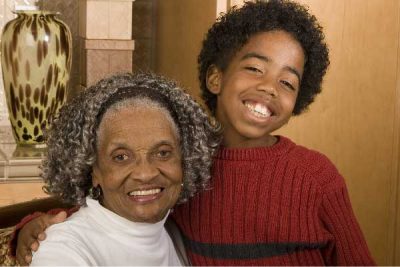Imagine a knock on the front door at night. Outside is a police officer, bringing a child to the safe-haven of a grandparent’s home. A grandparent might experience fear and confusion, trying to reconcile what has happened in the family and how to support the child. This is how a journey toward kinship care can begin.
May is Kinship Awareness Month, an opportunity to acknowledge relatives other than parents raising children. Nearly 50,000 family members in Washington are kinship caregivers. Many of the children in their care have experienced trauma and need special education or uniquely designed physical- or mental-health services.
Relatives who provide kinship care can qualify for state support. The Washington State Department of Social and Health Services (DSHS) provides a resource guide about kinship care that includes information about benefits and services, health care, legal issues and more. DSHS manages the kinship program as part of its Aging and Long-Term Support Administration (ALTSA).
Reasons that relatives other than parents raise children vary. Some family members are granted custody by courts involved in the child welfare system. In other circumstances, law enforcement places children with relatives after finding parents unfit. Parents may have died, or a relative may have intervened because of issues related to addiction or abuse. Some kinship caregivers are meeting a grandchild, niece, or nephew for the first time when that child needs a new home.
A child might arrive without any possessions. The financial cost and life disruption can significantly impact the relative providing kinship care. In Washington, the Kinship Navigator program can help. This program was adopted by the state in 2003.
A Kinship Navigator can direct family caregivers to a variety of community resources related to healthcare, finances, legal services, support groups, training, child care and emergency funds. Kinship Navigators also can explain how to apply for federal and state benefits. The Kinship Navigator helps families establish or maintain greater self-sufficiency and long-term stability, often with a goal to keep children out of foster care.
A navigator can help family caregivers get involved with support groups and learn to balance the needs of the child with a potentially complicated relationship with the child’s parents. Daycare options can be located, and children might gain access to recreational and social activities to help them find belonging in a new life circumstance.
In spring 2019, Governor Jay Inslee signed into law Senate Bill 5641 to create a statewide kinship care legal aid coordinator. The state budget was expanded to include $500,000 for growth of the Kinship Care Support Program and $468,000 to fund Tribal Navigators for Native American families. One of the bill’s supporters was Rep. Eric Pettigrew, who in 2002 helped create a statewide Kinship Care Oversight Committee that led to development of the state’s kinship programming.
The Seattle Times published an article Dec. 28, 2018, about kinship care and reimbursement rates in comparison to foster care. According to the Times, about 43,000 relatives other than parents are raising children in Washington State. More than 90 percent of those caregivers are grandparents. The article includes data that most families choose not to become legal foster parents because of state scrutiny over the welfare system. Informal kinship-care arrangements are four times more common than formal foster care.
Generations United, a Washington, D.C.-based nonprofit, collects data about government costs and savings related to kinship care. The agency coordinates projects to strengthen intergenerational connections and offers ways for families to advocate for system improvements to benefit children, youth and older adults.
The Military Parent Technical Assistance Center, The Branch, provides specific guidance about benefits and other issues that impact short- and long-term kinship caregivers in military families.

